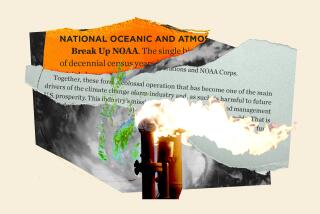Prompt Action to Curb Global Warming Urged : Environment: Science panel says U.S. could cut ‘greenhouse’ pollution 40% with little economic cost.
- Share via
WASHINGTON — Concluding that the threat of global warming is serious enough to warrant prompt national action, a panel of the prestigious National Academy of Sciences said Wednesday that the United States could reduce its production of “greenhouse” pollution as much as 40% with little or no economic cost.
It recommended that the nation pursue a series of steps to provide an insurance policy against expensive mitigation efforts should the more dire predictions of man-made climate change be borne out in the future.
“There are a lot of people in San Francisco who bought insurance two days after the earthquake and wished they had done it earlier,” said former Republican Sen. Daniel J. Evans, who presented the results of the two-year study on policy implications of greenhouse warming.
The call for early action reversed a hands-off recommendation made by a similar academy panel eight years ago and called for a far more aggressive posture than the cautious approach adopted by the Bush Administration.
Given current production of carbon dioxide, methane and man-made gases known as chlorofluorocarbons, some projections are that the Earth’s average temperature could increase by as much as 9 degrees Fahrenheit, with potentially catastrophic results, in the next century.
But while most of the industrial nations of the world have set firm goals for reducing their production of carbon dioxide, the most prominent of the atmospheric gases that trap the sun’s radiation, the Bush Administration has refused to adopt similar targets and insisted upon exhaustive consideration of the economic impact of cutting back carbon dioxide production.
The academy panel Wednesday recommended that the United States raise energy prices, taking into account the social and environmental costs of energy production. It also called for energy-efficient building codes, improved efficiency of the nation’s automobile fleet through regulation and tax incentives, increased support for mass transit, improved efficiency standards for electrical appliances and studies aimed at measures to slow deforestation of the country.
For the longer term, it called for research aimed at both combatting the warming phenomenon and adapting to whatever happens.
Specifically, it called for improved efficiency of water use through higher prices and supply management and increased agricultural research.
The United States should join international research efforts, it said, in areas such as alteration of clouds, the use of space mirrors to deflect incoming radiation and ways to cause the oceans to increase their absorption of carbon from the atmosphere.
Although the recommendations include proposals for conservation initiatives conspicuously missing from the Administration’s national energy strategy, White House science adviser D. Allan Bromley praised the study for “presenting both science and policy options in a very clear and reasonable fashion.”
What most pleased the Administration, however, was the panel’s recommendation that work be pressed to develop and test a new generation nuclear power reactor.
In spite of that, global warming experts in the environmental community hailed the report as a significant development in the long and bitterly divided debate over climate change policy.
“It breaks new ground by presenting a plethora of measures which can reduce emissions and save money for the taxpayers at the same time,” said Michael Oppenheimer, the global warming expert at the Environmental Defense Fund. “It is a new way of looking at the problem. Very significant reductions at a low cost or at net savings is a very significant finding.”
Rafe Pomerance, a senior research associate at the World Resources Institute, called the study a door opening for discussion of “global warming tax reform” and energy pricing that includes environmental costs as well as costs such as labor and transportation.
The step deemed most important in early reductions of greenhouse gases is the elimination of the chlorofluorocarbons used in air conditioners and refrigerators and other CFCs used as solvents and for industrial purposes.
More than 50 nations already have committed themselves to phase out CFCs by the year 2000--developing countries have until 2010--and the panel said that research efforts should be stepped up to find nonpolluting substitutes.
Besides acting as a greenhouse gas, CFCs attack the stratospheric ozone layer that protects the Earth’s surface from powerful ultraviolet radiation from the sun. Just a week ago, Environmental Protection Agency Administrator William K. Reilly said that ozone depletion in the Northern Hemisphere has been proceeding about twice as fast as earlier believed and estimated that the United States might suffer an additional 200,000 skin cancer deaths over the next 50 years as a result.
In discussing the academy’s global warming report Wednesday, Evans said that it might be advisable to step up the international attack on CFCs.
Already, more than 30 U.S. senators have told Reilly in a letter that in view of the new findings he is required by the 1990 clean air law to impose a more stringent CFC phase-out schedule.
Sen. Albert Gore Jr. (D-Tenn.) has introduced a resolution calling for an emergency meeting of the signatories to the CFC phase-out treaty.
In a telephone interview Wednesday, Bromley said that he considers such an emergency session unnecessary and he questioned the EPA’s cancer fatality projections, suggesting that they may be more than 25% too high.
The academy report will be followed later this year by publication of supporting volumes from three other panels.
The conclusions and recommendations reported Wednesday, Evans said, “steered a steady course between those who see no problem and those who believe disaster is upon us. We are prepared for a national debate, which I hope will lead to a policy consensus.”






